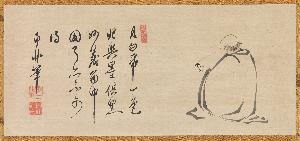Sokuhi Nyoitsu
Sokuhi Nyoitsu;Jifei Ruyi
Place: China
Born: 1616
Death: 1671
Biography:
, a renowned Buddhist monk and artist, was born in Fuzhou, Fujian, Southeast China in 1616. He was ordained at the age of 17 by Feiyin Tongrong and later became a disciple of Ingen, abbot of Wanfu Temple, Mount Huangbo, Fujian. Sokuhi's artistic talent and spiritual devotion earned him a prominent place in the history of Zen Buddhist art.
Early Life and Training
Sokuhi was born into a declining Confucian scholar gentry family of the Chen clan. After his father's death, life became difficult for him and his mother. He received dharma transmission from Ingen and was promoted to high monastic office. Sokuhi's artistic style was influenced by his teacher Ingen and his colleague Muyan.
Artistic Career
In 1654, Ingen and Muyan traveled to Japan and summoned Sokuhi Nyoitsu, who followed to Nagasaki in 1657. Sokuhi was made abbot of Sōfuku-ji, a Chinese temple built in 1629, and Muyan was serving as abbot of Fukusai-ji. The two became known as nikanromon ("two gates to enlightenment"). Sokuhi's artistic talent was recognized by the lord of Kokura, who convinced him to stay in Japan.
Notable Works and Legacy
Sokuhi's notable works include his calligraphy and ink paintings on paper. His unique style and technique have been featured in various museums, including Museum of Zen Buddhist Culture. Sokuhi's legacy continues to inspire artists and collectors worldwide. His artwork can be found at https://Wikioo.org/@/Sokuhi-Nyoitsu, where his biography and notable works are showcased.
- Influences on Zen Art: Sokuhi's art was influenced by his teacher Ingen and his colleague Muyan.
- Meditation and Intuition: Sokuhi's artistic style reflects the emphasis on meditation and intuition in Zen Buddhist art.
- Simplicity and Expressiveness: Sokuhi's use of minimalist compositions conveys profound meanings, reflecting the Zen belief in direct experience.
Conclusion
Sokuhi Nyoitsu's artistic legacy continues to be celebrated at https://Wikioo.org, where his biography and notable works can be found. His unique style and technique have made him a prominent figure in the history of Zen Buddhist art. As a master of Zen Buddhist art, Sokuhi's work serves as an inspiration for artists and collectors worldwide. For more information on Sokuhi Nyoitsu and his artwork, visit https://Wikioo.org/@/Sokuhi-Nyoitsu or https://en.wikipedia.org/wiki/Sokuhi_Nyoitsu.



